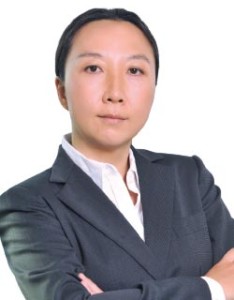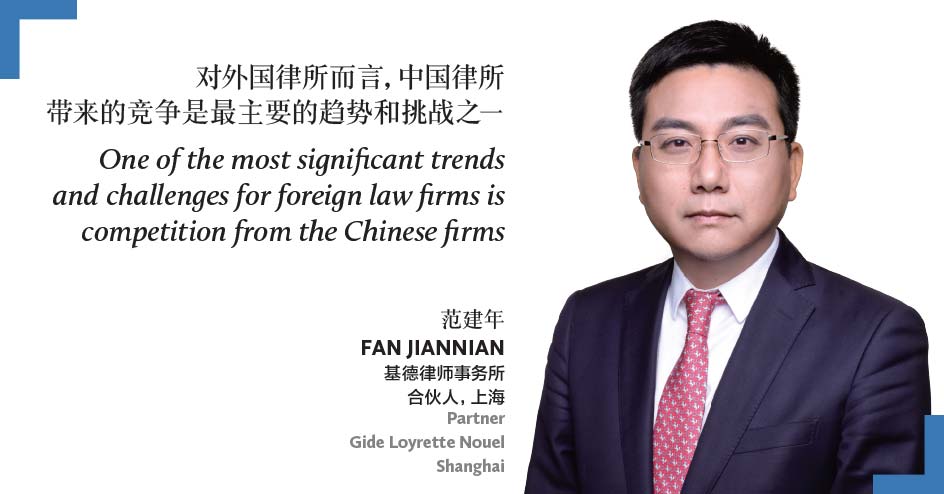Chinese and international law firms must learn quickly how to keep up with the fast-changing market, write Richard Li and Joy Jiao
Players in the legal services industry are feeling intense pressure not only from greater competition with other law firms, but also from the growing expectations of their clients, the necessity of training and retaining young talent, a changing commercial and regulatory landscape, and the need to engineer a tailored firm development plan that works.
Competition within the legal services industry has been one of the main sources of stress for practitioners, especially when the types of competitors are becoming more diverse. “With the deepening of opening up of the entire legal services industry, there has been an influx of cross-industry, cross-regional and cross-national competitors,” says Xu Guojian, managing partner at Boss & Young in Shanghai.
Qiao Jiaping, a director at Kangda Law Firm in Beijing, believes China’s legal services market is initially facing cross-industry legal services challenges. “Some countries have allowed non-lawyers to invest in law firms. Big Four accounting firms have set up legal service administrators in succession and many websites are starting to get involved in the legal services industry,” he says. “We must be fully aware of the competition and influence brought to the legal services market by these cross-industry, non-traditional legal sectors and practitioners.”
Qiao says the legal services markets of developed countries in Europe and America are relatively saturated, while in China competition for legal services has intensified. “[The European and the American] legal services industries are very competitive, while the Chinese legal services market is developing at a rate of more than 20% per year, which will inevitably attract lawyers and law firms in European and American developed countries to participate in the Chinese market competition.
“Generally speaking, Europe and American legal services, no matter their scale, history or management experience, far surpass China’s local law firms, which will inevitably bring us a huge impact, and these factors will bring unprecedented challenge to China’s legal services industry,” he says. “Competition with European and the American legal services will provide a great opportunity for Chinese law firms to learn from Europe and the US development experience, system and culture.”
On the other hand, fast growing PRC law firms have also caused international law firms a lot of pressure. “Under the current market environment, one of the most significant trends and challenges for foreign law firms is competition from the Chinese firms in term of the quality of the work, remuneration of the lawyers, increased language capacity, specialization of the lawyers, the development of their intentional network, etc.,” says Fan Jiannian, a partner at Gide Loyrette Nouel in Shanghai.
You must be a
subscribersubscribersubscribersubscriber
to read this content, please
subscribesubscribesubscribesubscribe
today.
For group subscribers, please click here to access.
Interested in group subscription? Please contact us.
你需要登录去解锁本文内容。欢迎注册账号。如果想阅读月刊所有文章,欢迎成为我们的订阅会员成为我们的订阅会员。
Internal competition
Besides external market competition, some law firms also face internal competition. Hua Xiaojun, a partner and management committee member at JunHe in Beijing, says Chinese firms also need to deal with internal co-operation issues in an appropriate way. “Under normal circumstances, there should be a co-operative relationship inside the same law firm, but in fact the internal competition of many law firms is in no way different from external competition,” he says. “The main reason is that the internal distribution system of the law firm is not conducive to sharing customers and case resources effectively, and achieving optimal allocation of lawyer resources on the project.”
According to Hua, when a law firm reforms its internal distribution system, it should consider its own development stage. “If it is a young law firm, partners’ ages are usually more similar and they are in the rising career stage, so everyone’s demands are more consistent,” he says. “But for a long-standing law firm like JunHe, the ages of the partners are uneven and their personal career developments are at different stages, so their demands are also different, which makes it difficult to find a system to meet all the demands of partners of different ages.”
A changing market
Senior lawyers share more thoughts on opportunities and challenges in China’s evolving market

Founding Partner
Chang Tsi & Partners
“The main challenges facing the legal services are: (1) frequent changes of laws, regulations, judicial interpretation and judicial practice; (2) information technology progress, such as WeChat becoming the most important means of information dissemination, and the high chance that artificial intelligence will replace the work of paralegals or junior lawyers; (3) low-price competition between peers; (4) domestic customers lacking awareness of the value of legal services; (5) professional division of labour becoming more elaborate and customer needs more integrated; (6) young lawyers’ higher requirements on income and treatment.
“In response to these challenges, the law firm needs to pay attention to its development strategy and: (1) timely collect and study the latest laws, regulations, judicial interpretations and judicial practice; (2) make full use of WeChat platform for business promotion; (3) improve the overall quality and capacity of personnel’s dealing with legal issues to provide customers with tailor-made unique legal services; (4) adhere to service quality and at the same time help the client reduce costs, and provide cost-effective services; (5) educate domestic customers on the importance and value of IP legal services; (6) provide customers with all-round, one-stop, multi-level, high-quality services; and (7) be good at finding and retaining talent, by providing space for development and reasonable treatment to retain outstanding lawyers.”
SPRING CHANG, Founding Partner, Chang Tsi & Partners, Beijing

Managing Partner
Boss & Young
“In order to obtain a comprehensive improvement of the individual, we need to rely more on the overall strength of the team and the firm, which is especially important for young lawyers who are still in the early stages of professional skills, because choosing a better team and a better law firm means that a lawyer will have a better learning and resource platform, and he can obtain an improvement of knowledge, skills and experience through the platform. Even for senior lawyers who have been at the forefront of the industry, support from an excellent team and law firm plays a key role in individual development.”
XU GUOJIAN, Managing Partner, Boss & Young, Shanghai

Director
DHH Law Firm
“Business models and co-operation methods are changing quickly, so legal services must also keep up with the pace of development and design forward-looking legal service products. Law firms need to encourage study, allocate tasks reasonably, further study professional knowledge and continue to develop legal products with features of the age.
“Lawyers should be pioneering and innovative in their familiar business, and closely follow current policy changes. They also need to make full use of information technology to improve research capacity and efficiency, and be good at describing their interim research results in words that can be published in influential media. On the one hand, lawyers help others to answer doubts; on the other hand, they promote their practice area and business ability.”
JIANG QI, Director, DHH Law Firm, Beijing

Asia Managing Partner
Eversheds Sutherland
“Compliance and regulatory advice is a significant growth area for Eversheds Sutherland following increased regulatory scrutiny of money-laundering and fraud, among other issues. This heightened awareness by both domestic and foreign organizations is generating a growing number of instructions to ensure these companies have appropriate compliance policies and programmes in place.”
STEPHEN KITTS, Asia Managing Partner, Eversheds Sutherland, Hong Kong

Senior Partner
City Development Law Firm
“The Belt and Road initiative brings City Development Law Firm a great development opportunity. A great percentage of our clients are construction enterprises. There are two parts to One Belt One Road, that is investment has to go out, and construction companies have to go out.
“We have organized about 30 professional lawyers to form a legal service centre to study the legal challenges that the Chinese enterprises may meet when going out. Our Kunming branch provided full legal services for Chinese enterprises when they were going out in the Laos China Mohan – Boten Economic Co-operation Zone Project.”
SHAO WANQUAN, Senior Partner, City Development Law Firm, Shanghai






















